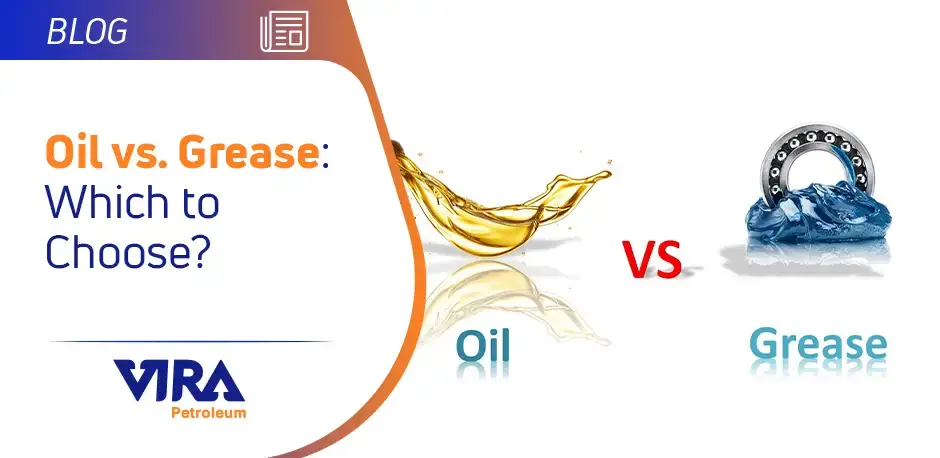When it comes to lubrication, oil and grease are two commonly used substances. However, many people are unaware of the differences between the two. In this article, we will explore the composition, viscosity, lubrication properties, advantages, and disadvantages of oil and grease, and help you choose which is best for your application. We will also answer some frequently asked questions about oil and grease. So, let’s dive in and learn about the differences between oil and grease!
Order : recycle base oil
What is Oil?
Oil is a lubricant that is a viscous liquid derived from petroleum or synthetic oil. It has a low viscosity and flows easily, making it ideal for use in applications where a liquid lubricant is needed. Oil is also used in a wide range of other applications, including as a fuel for engines and as a component in various chemical products. There are many different types of oil, each with its own set of properties and uses. Some common types include motor oil, hydraulic oil, and gear oil.
What is Grease?
Grease is a semi-solid lubricant composed of a base oil, a thickener, and additives. The base oil can be mineral oil, synthetic oil, or vegetable oil. The thickener is what gives grease its semi-solid consistency and is typically a metallic soap, such as lithium, aluminum, or calcium soap. Additives can include anti-wear agents, rust inhibitors, and antioxidants. Grease is used in applications where a thicker lubricant is needed to prevent dripping or splattering, such as in bearings or gears.
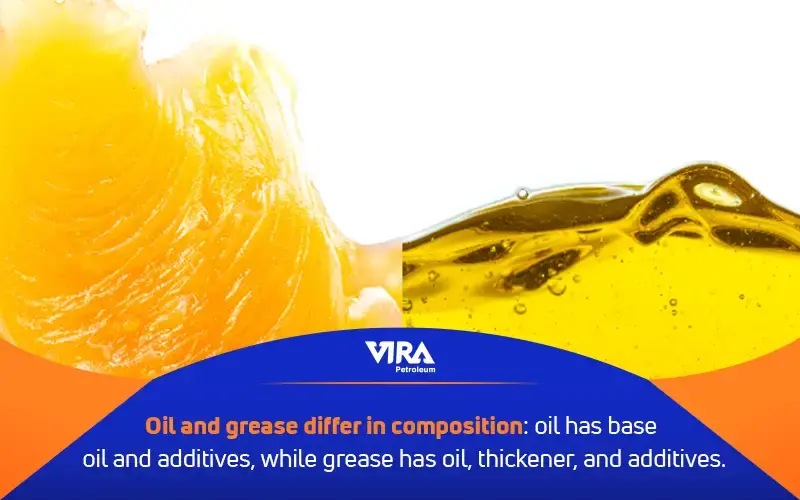
Composition of Oil and Grease
The composition of oil and grease is different. Oil is composed of base oil and additives, while grease is a mixture of oil, thickener, and additives. The base oil can be mineral oil, synthetic oil, or a blend of both, while the thickener can be soap or non-soap based. Additives are used to enhance the lubrication properties, improve viscosity, and prevent oxidation and corrosion. The composition of oil and grease can vary depending on their intended use and application.
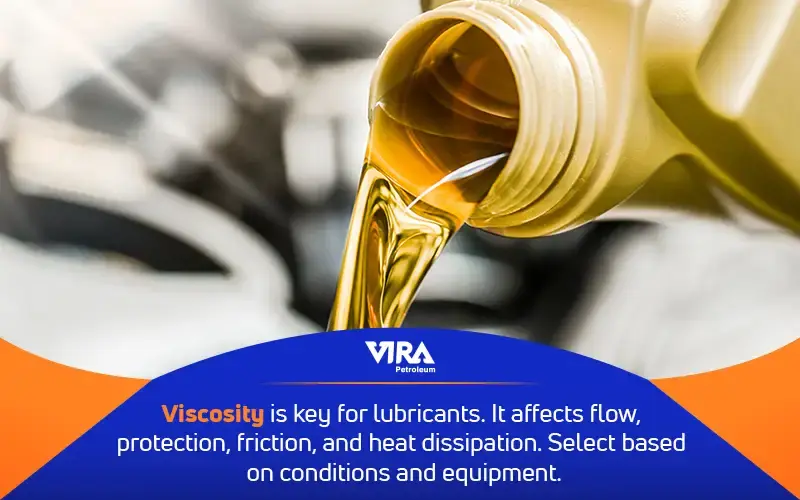
Viscosity of Oil and Grease
viscosity refers to the thickness or flow resistance of a lubricant. In general, oils have lower viscosity and flow more easily, while greases have higher viscosity and are more resistant to flow. The viscosity of an oil or grease is determined by factors such as its molecular structure, temperature, and pressure.
Viscosity is an important property to consider when choosing a lubricant as it affects the lubricant’s ability to provide a protective film between moving parts, reduce friction and wear, and dissipate heat. The appropriate viscosity grade depends on the operating conditions and the equipment’s requirements.
related topic : What is the Difference Between Base Oil and Crude Oil?
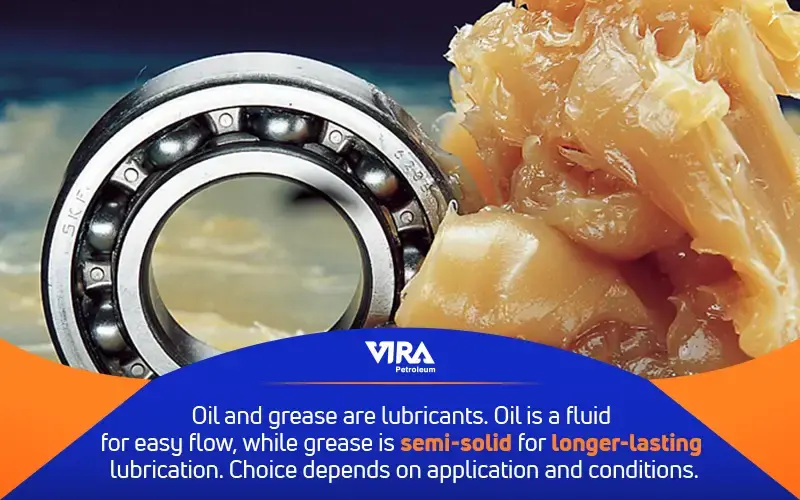
Lubrication Properties of Oil and Grease
Both oil and grease are used as lubricants to reduce friction between two surfaces. Oil is a low-viscosity fluid that can flow easily between surfaces, providing lubrication in areas where it can be difficult to apply grease. Grease, on the other hand, is a semi-solid substance that stays in place better than oil and can provide longer-lasting lubrication.
Grease is often preferred for areas where there is little or no airflow, high temperatures, or high pressure. It also has the advantage of preventing contaminants from entering the lubrication area. Both oil and grease have their own advantages and disadvantages, and the choice between them depends on the specific application and conditions.
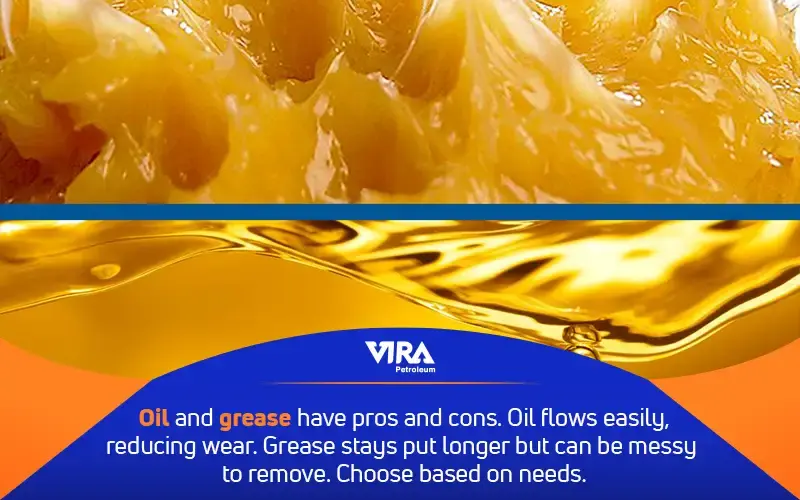
Advantages and Disadvantages of Using Oil and Grease
Oil and grease have their own set of advantages and disadvantages when used as lubricants. Oil is more fluid and can easily reach all the moving parts of a machine, reducing friction and wear. However, it may leak or drip out of the machine and require frequent refilling.
Grease, on the other hand, stays in place and provides long-lasting lubrication. It is particularly useful for high-load or high-temperature applications. However, it may not reach all parts of a machine as easily as oil, leading to increased wear in some areas. Additionally, removing old grease from a machine can be a messy and time-consuming task.
Choosing Between Oil and Grease for Your Application
When deciding between oil and grease for your application, there are several factors to consider. First, consider the operating conditions, such as temperature, speed, and load. For high-speed, low-load applications, oil is often the better choice, while for low-speed, high-load applications, grease may be more appropriate.
Another factor to consider is the equipment design and lubrication requirements. Some equipment is designed for oil lubrication, while others require grease. It’s important to follow the manufacturer’s recommendations to ensure proper lubrication and avoid equipment damage.
Cost and maintenance requirements are also important considerations. Grease may be more cost-effective in some applications, as it requires less frequent reapplication than oil. However, oil may be easier to apply and remove, making maintenance easier in some cases.
Ultimately, the choice between oil and grease depends on the specific application and equipment requirements. Consult with a lubrication expert or the equipment manufacturer to determine the best lubrication option for your needs.
read more : Base oil and additives
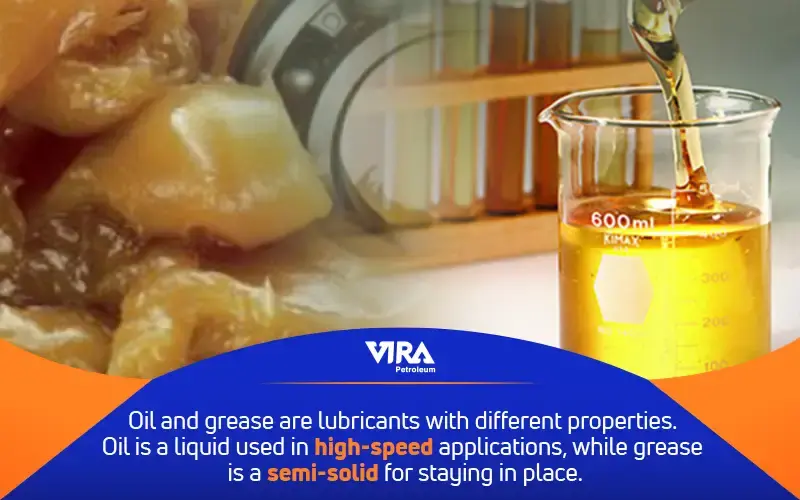
Difference Between Oil and Grease
Oil and grease are both lubricants used in various applications to reduce friction and wear. The main difference between oil and grease is their composition and physical properties. Oil is a liquid lubricant that flows freely and is typically used in applications where high-speed rotation is required.
Grease, on the other hand, is a semi-solid lubricant that is made up of oil and a thickener, typically soap or clay. Grease is ideal for applications where the lubricant needs to stay in place or resist being squeezed out, such as in bearings or gears. Choosing between oil and grease depends on the specific application and its requirements for lubrication properties, viscosity, and temperature range.

Use Grease Instead of Oil
The appropriateness of using grease instead of oil depends on your specific application. Grease is generally preferred in situations where there is a risk of leakage or drippage, in hard-to-reach areas where lubricant circulation is not feasible, or where a seal is necessary due to a high-contaminant environment.
It is also used to prevent rust and corrosion on metal surfaces, lubricate intermittently operated machines, and suspend solid additives in slow-speed, high-load sliding conditions. In addition, grease is suitable for use in sealed-for-life applications, under extreme or special operating conditions, and on badly worn machinery. Lastly, it can be used to reduce noise.
Comparison of Oil and Grease Properties
| Property | Oil | Grease |
|---|---|---|
| Consistency | Liquid | Semi-solid |
| Viscosity | Low | High |
| Lubrication | Short-term | Long-term |
| Heat dissipation | Good | Fair |
| Contamination | Attracts | dirt Resistant |
| Application | Easy | More difficult |
| Removal | Easy | More difficult |
Conclusion
In conclusion, understanding the difference between oil and grease is crucial in selecting the right lubricant for your application. Consider factors such as viscosity, lubrication properties, and environmental conditions to make an informed decision. Consult with a lubrication specialist for additional guidance and support.
